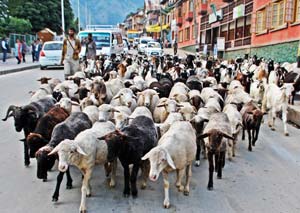SHAH ABBAS
SRINAGAR
Kashmir’s non vegetarian food habits are getting costly. The government calculations suggest that the Valley consumes 2,53,88,000 kilograms of mutton – mind you, beef is excluded, a year. It means a fortune – Rs 761 crore, a year on mutton alone.
Information tabled in the state legislative council suggested that not every kilogram is sourced from outside. While 1,44,08,000 kilograms are imported from outside, the net local produce is 1,09,80,000 kilograms. It means Kashmir market relies on 56 % imports from outside as it manages 44% percent locally.

Wazwan that has gradually emerged as one of the many identities of Kashmir is solely relying on these massive imports. Though part of the population has started reducing the intake of mutton, Wazwan still is the main item of the ‘bad’, fat Kashmiri marriages. Interestingly, thump rule is for every kilogram of mutton, it needs an equal amount to convert it into famous Wazwan dishes. Assuming that half of the mutton is consumed during marriages, it means the mutton and allied sector is already more than Rs 1000 crore business.
Despite having some of the best meadows and pastures in the world, most of the mutton imports are sourced from Rajasthan. Most of meadows in J&K especially in Ladakh and bordering LoC have been denied to the herdsmen for security and other reasons which has greatly impacted the local production of mutton. This has led to the sedentary life style of the herdsmen, mostly from Pir Panchal region in Rajuri and Poonch.
“Keeping in view the large requirement and the deficiency of mutton in Kashmir valley Elite Rams are being provided to upgrade the indigenous sheep population of the state,” the government said in the information that it tabled in the house. Employment Generation Schemes like establishment of Mini Sheep farms, Integrated development of Small Ruminants and Rabbits (IDSRR) Schemes have been initiated to encourage unemployed educated youth to establish units under these schemes. The government is working on the premise that these schemes will not only generate employment, but also increase the production of the mutton in Kashmir.















